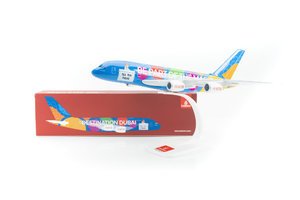Mcdonell douglas MD-80 TWA - "1996s" Colors
| Model manufacturer: | Jet-X |
| Order code: | JXL063B |
| Scale: | 1:200 |
| Material: | Metal |
| Weight: | 0.9 kg |
| Registration number: | EI-BWD |
| Dimensions: | 21×21×9 cm (L×W×H) |
| Air company: | Trans World (TWA) |
| Aircraft manufacturer: | Mcdonnell douglas |
Product description
The McDonnell Douglas MD-80 is a family of twin-engine, short- to medium-range, single-aisle commercial jet airliners. The MD-80 series were lengthened and updated from the DC-9. The airliner family can seat from 130 up to 172 passengers depending on variant and seating configuration.
The MD-80 series was introduced into commercial service on October 10, 1980 by Swissair. The series includes the MD-81, MD-82, MD-83, MD-87, and MD-88. These all have the same fuselage length except the shortened MD-87. The MD-80 series was followed into service in modified form by the MD-90 in 1995 and the MD-95/Boeing 717 in 1999.
Trans World Airlines (TWA) was an American airline from 1925 until bought out by and merged with American Airlines in 2001. TWA was a major domestic airline in the United States and the main U.S.-based competitor of Pan American World Airways (Pan Am) on intercontinental routes from 1946 until deregulation in 1978. TWA had hubs at Lambert-St. Louis International Airport and John F. Kennedy International Airport and focus cities in Kansas City, Los Angeles, and San Juan, Puerto Rico. In the 1980s they built a hub in Atlanta, which was reduced in the 1990s. TWA had pilot bases in Frankfurt and Berlin during the 1980s and they operated Boeing 727-100s within Europe. The company flew intra-European routes between Berlin, Frankfurt, London, Zurich, Hamburg, Stuttgart, Vienna, Amsterdam and Istanbul.
Flying to most major U.S. cities, TWA was one of the largest domestic airlines; before deregulation TWA, American Airlines, United Airlines, and Eastern Air Lines were known as the "Big Four". They also had a feeder operation from smaller cities in the Midwestern United States. Beyond the U.S., TWA had a large European and Middle Eastern network, served from their hub, the iconic TWA Flight Center, at John F. Kennedy International Airport. For a few years their routes circumnavigated the globe. TWA was a secondary unofficial flag carrier for the United States, especially after Pan Am was dissolved in the early 1990s.

























